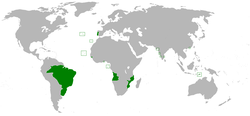Portugal in the Napoleonic era
| Kingdom of Portugal and the Algarves |
||||||||||
| Reino de Portugal e dos Algarves | ||||||||||
|
||||||||||
|
||||||||||
|
The Second Portuguese Empire in 1800
|
||||||||||
| Capital |
Lisbon (1777–1808; 1821–34) Rio de Janeiro (1808–21) |
|||||||||
| Languages | Portuguese | |||||||||
| Religion | Roman Catholic | |||||||||
| Government |
Absolute Monarchy (1777–1822 / 1823–26 / 1828–34) Constitutional Monarchy (1822–23 / 1826–28) |
|||||||||
| History | ||||||||||
| • | Treaty of San Ildefonso | 1777 | ||||||||
| • | Peninsular War | 1807–1814 | ||||||||
| • | Independence of Brazil | 1822 | ||||||||
| • | Liberal Wars | 1834 | ||||||||
| Currency | Portuguese real | |||||||||
|
||||||||||
The history of the kingdom of Portugal and the Algarves, from the First Treaty of San Ildefonso and the beginning of the reign of Queen Maria I in 1777, to the end of the Liberal Wars in 1834, spans a complex historical period in which several important political and military events led to the end of the absolutist regime and to the installation of a constitutional monarchy in the country.
In 1807, Napoleon ordered the invasion of Portugal and subsequently the royal family and its entire court migrated to Brazil, Maria I declaring the United Kingdom of Portugal, Brazil and the Algarves in 1816. This would be one of the causes for the declaration of Brazilian independence by Pedro I of Brazil in 1822, following a liberal revolution in Portugal.
The liberal period was stormy and short as Prince Michael of Portugal (Pedro's brother) supported an absolutist revolution endeavoring to restore all power to the monarchy. Pedro eventually returned to Portugal and fought and defeated his brother in the Liberal Wars in which liberalism prevailed and Portugal became a constitutional monarchy.
The death of King Joseph in 1777 forced the accession of Princess Maria Francisca, his eldest daughter, to the throne of Portugal; she succeeded her father as the first Queen regnant of the 650-year-old country, which was still recovering from the 1755 Lisbon earthquake. Before becoming queen, Princess Maria and her husband, the Infante Pedro, lived on the sidelines of politics, but were clearly unsympathetic to her father's former Prime Minister, Sebastião José de Carvalho e Melo, the Marquis of Pombal, who had been the de facto ruler of the kingdom for the past 27 years. During her father's last few years, she had been the Marquis' fiercest detractor; once in power, she eagerly dismissed him and then exiled him to Pombal.
...
Wikipedia



